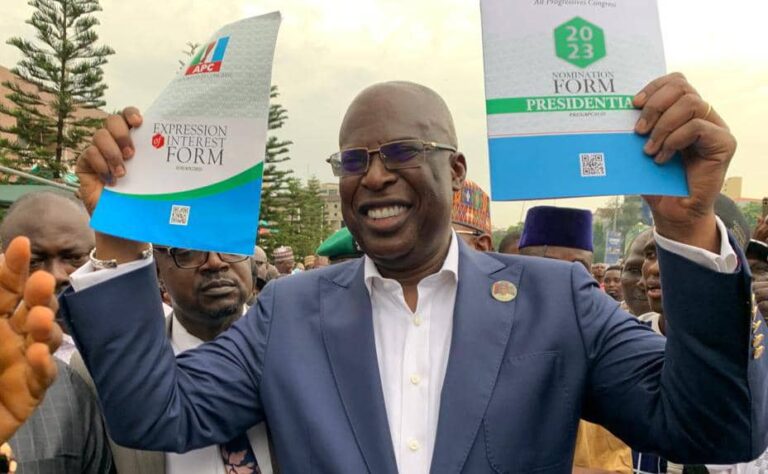Bayelsa Governorship Election: Court reserves judgment in Sylva’s appeal against disqualification

![]()
Court of Appeal in Abuja has reserved judgment in the appeals filed by Mr Timipre Sylva and his All Progressives Congress (APC) party seeking to overturn a Federal High Court in Abuja’s ruling which disqualified them former from the November 11 governorship election in Bayelsa State.

A three-member panel of the court, led by Justice Haruna Tsammani, made this known after counsel to the parties made their final submissions and adopted their written briefs on Friday.
It would be recalled that the Federal High Court, Abuja, Monday, October 9, disqualified the governorship candidate of the All Progressives Congress (APC), Chief Timipre Sylva, from contesting the November 11 election in Bayelsa State.
One Demesuoyefa Kolomo, a member of the APC, had in the suit marked: FHC/ABJ/CS/821/2023 filed on June 3, prayed the court to order INEC to delete Sylva’s name from the list of candidates contesting the governorship poll in Bayelsa on November 11.
In his ruling, Justice Donatus Okorowo, presiding judge, held that Sylva, having been sworn in twice and ruled for five years as governor of the state, would breach the 1999 constitution if allowed to contest again.
The judge held that Sylva was not qualified to run in the forthcoming poll because if he wins and is sworn in, he would spend more than eight years in office as governor of the state.
The Court of Appeal in Abuja had scheduled a hearing for Friday (October 27, 2023) to hear the appeal filed by Sylva, who is asking the appellant court to vacate the judgment of the Federal High Court in Abuja, which disqualified him from the election on the grounds that he was not validly nominated by the APC.
Sylva and the APC are also appealing the judgment, arguing that the High Court erred in law by delving into the internal affairs of the party.
Meanwhile, when the case was called, lawyer to Sylva, Akinlolu Kehinde, SAN, and counsel to the APC, K. O. Balogun, urged the court to allow the appeals, set aside the October 9 judgment and affirm Sylva’s candidacy.
Kehinde observed that Kolomo claimed the matter was a public interest action and that it was based on Sections 180 and 182 that the suit was filed.
The senior lawyer, however, argued that in his first oath taking, Sylva only spend 6 months, three weeks and two days in office before the election was annuled.
He wondered why the trial court would have given judgment in Kolomo’s favour, having not participated in the primary election that produced Sylva as an aspirant in accordance with Section 285.
He submitted that Koloma lacked legal right to institute the suit, hence, it ought to have been dismissed.
“Section 285 strictly defines that you must be an aspirant to challenge an election and there is a timeframe within which to challenge the poll.
“We urge this honourable court to look at our processes and agree with us that the judgment was a hatchet job just to tie this man (Sylva) not to campaign and participate in the election,” he said.
He said presently Sylva’s name had been removed from INEC’s list of candidates for the poll, urging the court to allow their appeals.
Balogun also argued that it was wrong for the trial court to have entertained the suit by Kolomo because he lacked the locus to approach the court, as he faulted the decision of Justice Okorowo, to the effect that Sylva took oath of office twice as Governor of Bayelsa State.
“In 2007 he (Sylva) was elected the Governor of Bayelsa State, but within few months, the Court of Appeal (which was then the final court for governorship election petition) sacked him.
“He contested again in 2008 and won. The eight months that he earlier spent in office was nullified,” he said, arguing that the FHC should not have agreed with Kolomo because those months were voided by the court.
“What he (Kolomo) is doing is fighting a proxy war. He cannot be a member of the APC and be fighting to destroy its candidate and chances at the election.
“What the 1st respondent (Kolomo) is asking this court to do is to deem the nullified months as 4 years,” Balogun explained.
Members of the court’s panel also wondered why Kolomo, who claimed to be a member of the APC, but not an aspirant, who participated in the party’s primary, would want to destroy his party’s chance in an election.
They said instead, he would have voted for another party in the poll if he assumed Sylva did not deserve his vote.
The panel also condemned the attitude of counsel who failed to advise their clients appropriately on such issues, saying “it is a moral issue.”
Balogun later informed the court that his client filed a motion to compel INEC to reverse its decision to remove Sylvia’s name from the list of candidates for the election.
Justice Tsammani said since the court had chosen to hear the main appeals, it was unnecessary to hear any interlocutory motions.
Lawyer to Kolomo, Prof. Abiodun Amuda-Kanike, SAN, urged the court to dismiss the appeal and affirm the judgment of the trial court.
INEC’s lawyer, Ahmed Mohamed, also prayed the court to dismiss both appeals.
After taking all the arguments, the panel reserved judgment in the appeals at a later date to be communicated to parties.
Last Tuesday, Sylva had asked INEC to withdraw its recently released amended list of candidates eligible to contest the November 11, 2023 poll in the state.
Sylva, through his lawyer, Mr. Ahmed Raji, SAN, said in a letter to INEC claimed that the commission’s decision to exclude his name from the list was prejudicial, as he had already appealed the judgment of a Federal High Court in Abuja, which disqualified him from the race.
The letter argued that it was wrong for INEC to release the amended list while the appeal was still pending, as it could prejudice the outcome of the case, while also pointing out that the parties to the suit in which Sylva was disqualified were not candidates in the election and, therefore, had nothing to lose.
Sylva’s counsel urged INEC to reconsider its decision and to wait for the outcome of the appeal before taking any further action.
“We know that the Commission has always been consistent in a matter like this, to wait until the entire appellate process and proceedings are completed, one way or the other,” he said.



